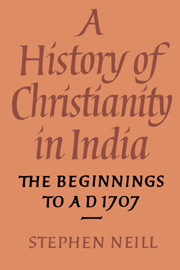Book contents
- Frontmatter
- Contents
- Preface
- The Spelling of Indian Names
- Abbreviations
- Maps
- PART ONE
- PART TWO
- PART THREE
- 11 India in the Seventeenth Century
- 12 The Mission of Mathurai
- 13 The Thomas Christians Again
- 14 Other Roman Catholic Missions
- 15 Non-Roman Catholic Christianity in India
- APPENDICES
- Notes
- Select Bibliographies
- Index
15 - Non-Roman Catholic Christianity in India
from PART THREE
Published online by Cambridge University Press: 04 September 2009
- Frontmatter
- Contents
- Preface
- The Spelling of Indian Names
- Abbreviations
- Maps
- PART ONE
- PART TWO
- PART THREE
- 11 India in the Seventeenth Century
- 12 The Mission of Mathurai
- 13 The Thomas Christians Again
- 14 Other Roman Catholic Missions
- 15 Non-Roman Catholic Christianity in India
- APPENDICES
- Notes
- Select Bibliographies
- Index
Summary
ANGLICAN BEGINNINGS
The first half of the seventeenth century in Europe was an intensely religious age. The new counter-reformation piety was finding expression in such works as the Introduction to the Devout Life of Francis de Sales, bishop of Geneva (1567–1622). Lancelot Andrewes, bishop of Winchester (1555–1626), and George Herbert (1593–1633), were producing imperishable memorials of Anglican devotion. The work, however, which perhaps more than any other gave expression to the new age came from Holland. That universal genius Hugo Grotius produced in 1627 his work de Veritate Christianae Religionis. This book marked a new beginning in ecumenical thinking.
At that time the missionary awakening of the Protestant churches had hardly begun. But the capacious mind of Grotius reached out far beyond his native Holland. He saw that the expansion of European influence in the world must be accompanied, if Europe was to be true to its great traditions, by an extension of Christian concern. He wrote his book in the hope that it might be useful to mariners voyaging to the far places of the earth. For missionary purposes the de Veritate was translated into Arabic (1660) by the eminent Arabist Edward Pocock (1604–91), the expenses of the edition being borne by Robert Boyle (1627–91). It appears that it was translated also into Persian, Chinese and Malay.
- Type
- Chapter
- Information
- A History of Christianity in IndiaThe Beginnings to AD 1707, pp. 364 - 387Publisher: Cambridge University PressPrint publication year: 1984



